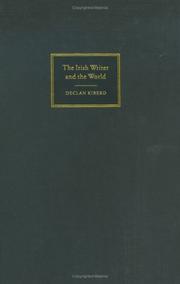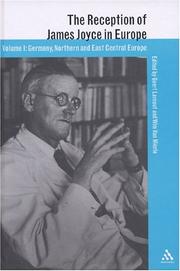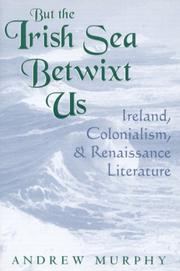| Listing 1 - 8 of 8 |
Sort by
|
Book
ISBN: 1527523810 9781527523814 1527509249 9781527509245 Year: 2018 Publisher: Newcastle-upon-Tyne, UK : Cambridge Scholars Publishing,
Abstract | Keywords | Export | Availability | Bookmark
 Loading...
Loading...Choose an application
- Reference Manager
- EndNote
- RefWorks (Direct export to RefWorks)
Civilization --- Irish --- Irish influences. --- Migrations. --- Ireland --- Civilization.
Book
ISBN: 0773598677 0773598669 9780773598669 9780773598676 Year: 2016 Publisher: Montreal : McGill-Queen's University Press,
Abstract | Keywords | Export | Availability | Bookmark
 Loading...
Loading...Choose an application
- Reference Manager
- EndNote
- RefWorks (Direct export to RefWorks)
Despite distance and differences in culture, the early twentieth century was a time of literary cross-pollination between Ireland and Japan. Notably, the Irish poet and playwright William Butler Yeats had a powerful influence on Japanese letters, at the same time that contemporary and classical Japanese literature and theatre impacted Yeats’s own literary experiments. Citing an extraordinary range of Japanese and Irish texts, Aoife Hart argues that Japanese translations of Irish Gaelic folklore and their subsequent reception back in Ireland created collisions, erasures, and confusions in the interpretations of literary works. Assessing the crucial roles of translation and transnationalism in cross-cultural exchanges between the Celtic Revival and Japanese writers of the modern period, Hart proves that interlingual dialogue and folklore have the power to reconstruct a culture’s sense of heritage. Rejecting the notion that the Celtic Revival was inward and parochial, Hart suggests that, seeking to protect their heritage from the forces of globalization, the Irish adapted their understanding of heritage to one that exists within the transnational contexts of modernity – a heritage that is locally produced but internationally circulated. In doing so, Hart maintains that the cultural contact and translation between the East and West traveled in more than one direction: it was a dialogue presenting modernity’s struggles with cosmopolitanism, gender, ethnic identity, and transnationalism. An inspired exploration of transpacific literary criticism, Yeats scholarship, and twentieth-century Japanese literature, Ancestral Recall tracks the interplay of complex ideas across languages and discourses.
Irish literature --- Japanese literature --- British literature --- History and criticism. --- Irish influences. --- Japanese influences. --- Appreciation
Book
ISBN: 0268104913 0268104891 9780268104917 9780268104924 0268104921 9780268104894 9780268104894 Year: 2018 Publisher: Notre Dame, Indiana : University of Notre Dame Press,
Abstract | Keywords | Export | Availability | Bookmark
 Loading...
Loading...Choose an application
- Reference Manager
- EndNote
- RefWorks (Direct export to RefWorks)
"In the early nineteenth century, thousands of volunteers left Ireland behind to join the fight for South American independence. Lured by the promise of adventure, fortune, and the opportunity to take a stand against colonialism, they braved the treacherous Atlantic crossing to join the ranks of the Liberator, Simón Bolívar, and became instrumental in helping oust the Spanish from Colombia, Panama, Venezuela, Ecuador, Peru, and Bolivia. Today, the names of streets, towns, schools, and football teams on the continent bear witness to their influence. But it was not just during wars of independence that the Irish helped transform Spanish America. Irish soldiers, engineers, and politicians, who had fled Ireland to escape religious and political persecution in their homeland, were responsible for changing the face of the Spanish colonies in the Americas during the eighteenth century. They included a chief minister of Spain, Richard Wall; a chief inspector of the Spanish Army, Alexander O'Reilly; and the viceroy of Peru, Ambrose O'Higgins. Whether telling the stories of armed revolutionaries like Bernardo O'Higgins and James Rooke or retracing the steps of trailblazing women like Eliza Lynch and Camila O'Gorman, Paisanos revisits a forgotten chapter of Irish history and, in so doing, reanimates the hopes, ambitions, ideals, and romanticism that helped fashion the New World and sowed the seeds of Ireland's revolutions to follow."--Provided by publisher.
Revolutionaries --- Irish --- Irishmen (Irish people) --- Ethnology --- Revolutionists --- Dissenters --- Counterrevolutionaries --- History. --- History --- Latin America --- South America --- Asociación Latinoamericana de Libre Comercio countries --- Neotropical region --- Neotropics --- New World tropics --- Spanish America --- Civilization --- Irish influences.

ISBN: 9780511485923 9780521841634 9780521602570 0511130589 9780511130588 051112905X 9780511129056 0511130201 9780511130205 0511485921 1280225653 9781280225659 0521602572 0521841631 1107151414 9781107151413 0511200137 9780511200137 0511300573 9780511300578 Year: 2005 Publisher: Cambridge ; New York : Cambridge University Press,
Abstract | Keywords | Export | Availability | Bookmark
 Loading...
Loading...Choose an application
- Reference Manager
- EndNote
- RefWorks (Direct export to RefWorks)
The Irish Writer and the World is a major new book by one of Ireland's most prominent scholars and cultural commentators. Declan Kiberd, author of the award-winning Irish Classics and Inventing Ireland, here synthesises the themes that have occupied him throughout his career as a leading critic of Irish literature and culture. Kiberd argues that political conflict between Ireland and England ultimately resulted in cultural confluence and that writing in the Irish language was hugely influenced by the English literary tradition. He continues his exploration of the role of Irish politics and culture in a decolonising world, and covers Anglo-Irish literature, the fate of the Irish language and the Celtic Tiger. This fascinating collection of Kiberd's work demonstrates the extraordinary range, astuteness and wit that have made him a defining voice in Irish studies and beyond, and will bring his work to new audiences across the world.
English literature --- National characteristics, Irish, in literature. --- Biculturalism in literature. --- Multiculturalism in literature. --- Irish literature --- British literature --- Inklings (Group of writers) --- Nonsense Club (Group of writers) --- Order of the Fancy (Group of writers) --- Irish authors --- History and criticism. --- Foreign influences. --- Irish influences. --- English influences. --- Ireland --- In literature. --- Political aspects. --- Authors [Irish ] --- History and criticism --- Arts and Humanities --- Literature
Book
ISBN: 0813066980 0813067170 0813057884 9780813057880 9780813066981 Year: 2021 Publisher: Gainesville : University Press of Florida,
Abstract | Keywords | Export | Availability | Bookmark
 Loading...
Loading...Choose an application
- Reference Manager
- EndNote
- RefWorks (Direct export to RefWorks)
This volume sheds light on how the text and physical design of Joyce's 'Ulysses' and 'Finnegans Wake' reflect changes that transformed Europe between World War I and II. Looking beyond the commonly studied Irish historical context of these works, Tekla Mecsnóber calls for more attention to their place among broader cultural and political processes.
Joyce, James, --- Criticism and interpretation --- History. --- Europe --- Intellectual life --- Civilization --- Irish influences. --- Joyce, James Augustine Aloysius --- Joyce, James --- Dzhoĭs, Dzheĭms Avgustin Aloiziĭ --- Džoiss, Džeimss --- Gʻois, Gʻaims --- Joyce, Giacomo --- Jūyis, Jīms --- Tzoys, Tzaiēms --- Tzoys, Tzeēms --- Джойс, Джеймс --- Джойс, Джеймс Августин Алоїсуїс --- Zhoĭs, Zheĭms --- ג׳ויס, ג׳ײמס, --- ג׳ויס, ג׳יימס, --- ジョイス --- ジェームスジョイス, --- Ireland --- Book design.

ISBN: 0826458254 1847146015 9786611298449 1281298441 1847142966 9780826458254 9781847142962 9781281298447 Year: 2004 Volume: *4 Publisher: London ; New York : Thoemmes Continuum,
Abstract | Keywords | Export | Availability | Bookmark
 Loading...
Loading...Choose an application
- Reference Manager
- EndNote
- RefWorks (Direct export to RefWorks)
This collection of essays prepared by an international team of scholars, critics and translators, records the ways in which James Joyce's work has been received, translated and published in different areas of Europe. Joyce is now widely considered one of the most influential writers of the twentieth century. The impact of his work has been significant not only in the English-speaking world, but also in many European literatures. The essays in this collection explore the reception of Joyce in Germany, Russia, Scandinavia, Eastern Europe, Italy, France, Spain, Greece and Ireland.
Literature publishing --- Books and reading --- Criticism --- History --- Joyce, James, --- Translations --- History and criticism --- Criticism and interpretation --- Appreciation --- Europe --- Intellectual life --- Civilization --- Irish influences --- Comparative literature --- Joyce, James --- 20th century --- History. --- History and criticism. --- Irish influences. --- Evaluation of literature --- Literary criticism --- Literature --- Rhetoric --- Aesthetics --- Appraisal of books --- Books --- Choice of books --- Reading, Choice of --- Reading and books --- Reading habits --- Reading public --- Reading --- Reading interests --- Reading promotion --- Literary publishing --- Publishers and publishing --- Technique --- Evaluation --- Appraisal --- Publishing --- Joyce, James Augustine Aloysius --- Dzhoĭs, Dzheĭms Avgustin Aloiziĭ --- Džoiss, Džeimss --- Gʻois, Gʻaims --- Joyce, Giacomo --- Jūyis, Jīms --- Tzoys, Tzaiēms --- Tzoys, Tzeēms --- Джойс, Джеймс --- Джойс, Джеймс Августин Алоїсуїс --- Zhoĭs, Zheĭms --- ג׳ויס, ג׳ײמס, --- ג׳ויס, ג׳יימס, --- ジョイス --- ジェームスジョイス, --- Ireland --- Literature publishing - Europe - History - 20th century --- Books and reading - Europe - History - 20th century --- Criticism - Europe - History - 20th century --- Joyce, James, - 1882-1941 - Translations - History and criticism --- Joyce, James, - 1882-1941 - Criticism and interpretation - History --- Joyce, James, - 1882-1941 - Appreciation - Europe --- Europe - Intellectual life - 20th century --- Europe - Civilization - Irish influences --- Joyce, James, - 1882-1941

ISBN: 1281298948 9786611298944 1847143121 9781847143129 6611298940 0826468470 9780826468475 9781281298942 Year: 2005 Publisher: London ; New York : Thoemmes Continuum,
Abstract | Keywords | Export | Availability | Bookmark
 Loading...
Loading...Choose an application
- Reference Manager
- EndNote
- RefWorks (Direct export to RefWorks)
Jonathan Swift has had a profound impact on almost all the national literatures of Continental Europe. The celebrated author of acknowledged masterpieces like A Tale of a Tub (1704), Gulliver's Travels (1726), and A Modest Proposal (1729), the Dean of St Patrick's, Dublin, was courted by innumerable translators, adaptors, and retellers, admired and challenged by shoals of critics, and creatively imitated by both novelists and playwrights, not only in Central Europe (Germany and Switzerland) but also in its northern (Denmark and Sweden) and southern (Italy, Spain, and Portugal) outposts, as wel
European literature --- Irish influences. --- Swift, Jonathan, --- Swift, Jonathan --- di Marco, Corolini --- Swift, Dean --- Gulliver, Lemuel --- Appreciation --- Translations --- History and criticism. --- Criticism and interpretation --- History. --- Influence. --- Svift, Dzhonatan, --- Du Baudrier, --- Wagstaff, Simon, --- Fribble, Timothy, --- Baudrier, --- Drapier, M. B., --- Swift, J. --- Author of The conduct of the allies, --- Conduct of the allies, Author of the, --- Philomath, T. N., --- T. N., --- N., T., --- TN, --- Swift, --- Hope, Thomas, --- A. B., --- B., A., --- Author of The short view of the state of Ireland, --- Short view of the state of Ireland, Author of the, --- Author of Gulliver's travels, --- Gulliver's travels, Author of, --- S --- -t, --- D--n S --- -t --- Sṿifṭ, Yonatan, --- Misosarum, Gregory, --- Ssu-wei-fo-tʻe, Kʻuang-sheng, --- Fizle, Obadiah, --- Soyipht, Tzonathan, --- Soyipht, Iōnathan, --- Swift, Jonatán, --- Свифт, Джонатан, --- סבפט, יונתן, --- סוויפט, יאנאטהאן, --- סויפט, יונתן, --- סװיפט, יאנאטהאן, --- סװיפט, י., --- Bickerstaff, Isaac, --- Sviphṭa, Jonāthana, --- M., Stephen, --- Author of A tale of a tub,

ISBN: 0813149509 0813170133 9780813170138 0813120861 9780813149509 1322594066 0813192781 Year: 2009 Publisher: Lexington, Kentucky : The University Press of Kentucky,
Abstract | Keywords | Export | Availability | Bookmark
 Loading...
Loading...Choose an application
- Reference Manager
- EndNote
- RefWorks (Direct export to RefWorks)
At the rise of the Tudor age, England began to form a national identity. With that sense of self came the beginnings of the colonialist notion of the ""other"""" Ireland, however, proved a most difficult other because it was so closely linked, both culturally and geographically, to England. Ireland's colonial position was especially complex because of the political, religious, and ethnic heritage it shared with England. Andrew Murphy asserts that the Irish were seen not as absolute but as ""proximate"" others. As a result, English writing about Ireland was a problematic process, since standard
Renaissance --- Colonies in literature. --- English literature --- Irish influences. --- History and criticism. --- Jonson, Ben, --- Spenser, Edmund, --- Shakespeare, William, --- Dzhonson, Ben, --- Джонсон, Бен, --- B. J. --- J., B. --- Iohnson, Ben, --- Johnson, Ben, --- Jonson, Benjamin, --- דזשאָנסאָנ, בענ --- Immerito, --- Spencer, Edmund, --- Spenser, Edmond, --- Shakespeare, William --- Shakespear, William, --- Shakspeare, William, --- Šekʻspiri, Uiliam, --- Saixpēr, Gouilliam, --- Shakspere, William, --- Shikisbīr, Wilyam, --- Szekspir, Wiliam, --- Šekspyras, --- Shekspir, Vilʹi︠a︡m, --- Šekspir, Viljem, --- Tsikinya-chaka, --- Sha-shih-pi-ya, --- Shashibiya, --- Sheḳspir, Ṿilyam, --- Shaḳspir, Ṿilyam, --- Syeiksŭpʻio, --- Shekspir, V. --- Szekspir, William, --- Shakespeare, Guglielmo, --- Shake-speare, William, --- Sha-ō, --- Şekspir, --- Shekspir, Uiliam, --- Shekspir, U. --- Šekspir, Vilijam, --- Ṣēkspiyar, Viliyam, --- Shakspir, --- Shekspyr, Vyli︠e︡m, --- Şekspir, Velyam, --- Ṣēkspiyar, Villiyam, --- Shēkʻspʻiyr, Vlilliam, --- Ṣēkspiyar, --- Ṣēkspiyar Mahākavi, --- Ṣēkspiyar Mahākaviya, --- Sheḳspier, Ṿilyam, --- Shēkʻspir, --- Shakespeare, --- Śeksper, --- Шекспир, Вильям, --- Шекспир, Уильям, --- שייקספיר, וויליאם, --- שייקספיר, וו., --- שיקספיר, וויליאם --- שיקספיר, ויליאם --- שיקספיר, ויליאם, --- שכספיר, ויליאם, --- שכספיר, וילים, --- שכספיר, ו׳ --- שעפקספיר, וויליאם, --- שעקספיער, וויליאם --- שעקספיער, וויליאם, --- שעקספיער, ווילליאם --- שעקספיער, וו., --- שעקספיר --- שעקספיר, וו --- שעקספיר, וויליאם, --- שעקספיר, וויליאמ --- שעקספיר, ווילליאם --- שעקספיר, ווילליאם, --- שעקספיר, וו., --- שעקספיר, װיליאם, --- שעקספיר, װילליאם, --- שעקספיר, װ., --- שעקספער --- שעקספער, וויליאמ --- שקספיר --- שקספיר, וו --- שקספיר, וויליאם --- שקספיר, וויליאם, --- שקספיר, ווילים, --- שקספיר, וילאם --- שקספיר, ויליאם --- שקספיר, ויליאם, --- שקספיר, ויליים, --- שקספיר, וילים --- שקספיר, וילים, --- شاكسبير، وليم --- شاكسپير، وليم --- شكسبير، وليام --- شكسبير، وليم --- شكسبير، وليم، --- شكسبير، و. --- شكسپير، وليم --- شكسپير، ويليام --- شيكسبير، وليام --- شيكسبير، وليام.، --- شيكسبير، وليم --- شکسبير، وليم --- وليم شکسبير --- 沙士北亞威廉姆, --- 沙士比亞威廉姆, --- 莎士比亞威廉姆, --- 莎士比亞威廉, --- 莎士比亞, --- Knowledge --- Ireland. --- Ireland --- Irish Free State --- In literature. --- Historiography. --- History --- Foreign public opinion, English
| Listing 1 - 8 of 8 |
Sort by
|

 Search
Search Feedback
Feedback About UniCat
About UniCat  Help
Help News
News